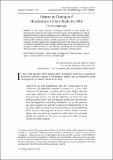Files in this item
History as contagion? Herodotus on silent trade (4.196)
Item metadata
| dc.contributor.author | Harrison, Thomas | |
| dc.date.accessioned | 2022-10-17T12:30:17Z | |
| dc.date.available | 2022-10-17T12:30:17Z | |
| dc.date.issued | 2022-10-12 | |
| dc.identifier | 281555426 | |
| dc.identifier | 1fd0eda4-c4c5-43fd-b3cd-13ca71716a64 | |
| dc.identifier.citation | Harrison , T 2022 , ' History as contagion? Herodotus on silent trade (4.196) ' , Syllogos , vol. 1 , pp. 1-30 . https://doi.org/10.48638/sylgs.2022.1.89896 | en |
| dc.identifier.other | ORCID: /0000-0003-1968-9859/work/120849459 | |
| dc.identifier.uri | https://hdl.handle.net/10023/26204 | |
| dc.description.abstract | This paper explores Herodotus’ account of ‘silent trade’, the phenomenon whereby two parties (in this instance, the Carthaginians and an unnamed Libyan people) exchange goods without any wider social contact. Drawing on parallel accounts of silent trade, it first explores the distinctive features of Herodotus’ version, and the question of its historicity. Secondly, it examines the story against the wider background of the Histories, in particular Herodotus’ model of human contact and his use of the marketplace as an analogy. Finally, it looks at one striking reworking of this episode of the Histories in the closing stanzas of Matthew Arnold’s Scholar Gipsy. | |
| dc.format.extent | 30 | |
| dc.format.extent | 253234 | |
| dc.language.iso | eng | |
| dc.relation.ispartof | Syllogos | en |
| dc.subject | Herodotus | en |
| dc.subject | Silent trade | en |
| dc.subject | Carthaginians | en |
| dc.subject | Phoenicians | en |
| dc.subject | Libyans | en |
| dc.subject | Agora | en |
| dc.subject | Contact | en |
| dc.subject | Matthew Arnold | en |
| dc.subject | Scholar Gipsy | en |
| dc.subject | D051 Ancient History | en |
| dc.subject | T-NDAS | en |
| dc.subject.lcc | D051 | en |
| dc.title | History as contagion? Herodotus on silent trade (4.196) | en |
| dc.type | Journal article | en |
| dc.contributor.institution | University of St Andrews. School of Classics | en |
| dc.identifier.doi | 10.48638/sylgs.2022.1.89896 | |
| dc.description.status | Peer reviewed | en |
This item appears in the following Collection(s)
Items in the St Andrews Research Repository are protected by copyright, with all rights reserved, unless otherwise indicated.

